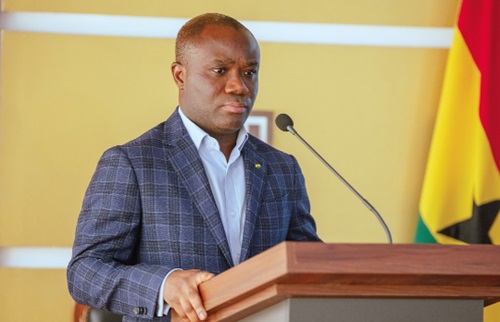
The Government says the ongoing proceedings emanating from the petitions against the suspended Chief Justice, Justice Gertrude Sackey Torkornoo, are guided by constitutional edicts rather than a personal effort to oust her from office.
It said the ongoing processes were, therefore, blind to her status as required by the Constitution.
“We cannot have a sacred cow mentality in the way we handle state affairs.
All public office holders, from the President to the Speaker (of Parliament) to the Chief Justice to Supreme Court judges to ministers to all public office holders are bound by the provisions of the rule of law,” the Spokesperson of the Office of the President and Minister of Government Communications, Felix Kwakye Ofosu, stated at a news conference in Accra yesterday.
The media address was arranged shortly after Justice Tornorkoo, through a news conference, broke her silence in public since the proceedings triggered by the petitions to remove her started, accusing the government of complicity in the effort to remove her from office.
“From the very first steps in this matter, the President has kept fidelity to the Constitution and has respected the spirit and letter of the Constitution.
Everything he has done has been by the book.
That is why all those who have commented on the matter, including the Chief Justice, have been unable to point to any specific provision under Article 146 that the President has been in breach of,” Mr Kwakye Ofosu stated.
The Constitution, he said, laid out the steps for investigating and determining misconduct by high office holders, including members of the judiciary.
Consequently, he debunked the claims by the Chief Justice that her suspension was politically motivated or had a political agenda, describing such insinuations as “unfounded, false, and cannot be allowed to stand”.
Unjust
Mr Kwakye Ofosu said while the government would have preferred to stay silent and allow the constitutionally mandated processes to run their course, “a number of things were said at the media engagement that, if left uncorrected, could create an erroneous impression and project government in a very unfair, unjust and unoriented light”.
Mr Kwakye Ofosu said the President had refrained from public commentary on the substance of the petitions out of respect for constitutional provisions that required confidentiality on the part of all parties.
“We respect the right of the Chief Justice to express any view that she holds about the matter in question to the extent that it is consistent with the rules because the Constitution makes it clear what the processes are in determining the matter of the sort that we are engaged with,” he said.
“So it would have been desirable that that constitutional provision was respected by her leadership, the Chief Justice, so that we do not have to engage in public commentary up until the time that the committee looking into the matter makes their determination.
We are compelled, however, to correct certain misimpressions that were created at the briefing,” he added.
The Chief Justice had complained about having to visit the intimidating environment of the Edu Lodge in close proximity to the Osu Castle, the former seat of government — for the hearing, saying it brought unpleasant memories of the place where a relative was killed.
But the Government Spokesman said the Edu Lodge, a government facility, was chosen by the committee.
Mr Kwakye Ofosu said such suggestion was completely misplaced, unfair and not justified.
“Edu Lodge is a state-owned facility used to accommodate visiting dignitaries and conduct high-level official business.
The decision to use that place was not imposed by government or President Mahama, but was requested by the committee looking into the matter,” he said.
“It is equipped with modern amenities that will facilitate the work of the committee, and is not intimidating by any reasonable standard.
Security measures are in place purely to safeguard the proceedings, not to create fear,” he added.
He further said that even if the hearings had been held at a normal court facility, similar security measures would have applied, as dictated by the in-camera nature of proceedings under Article 146(8).
Judges killings
Mr Kwakye Ofosu criticised efforts to link the current constitutional proceedings to the tragic killing of a Supreme Court judge, calling it “disingenuous” and “deeply regrettable”.
Addressing allegations that sensitive information about the petitions was deliberately leaked by the government, Mr Kwakye Ofosu countered that the first public disclosure of correspondence in the matter came from a letter written by the Chief Justice herself requesting copies of the petitions.
“Before the letter even arrived at the presidency, it was already circulating in the media. It was precisely because of this that the President instructed his Executive Secretary to mark all official correspondence to prevent further leakage,” he said.
He also pointed out that the media houses that first published the contents of the petitions were known to be aligned with the opposition, further undermining claims of executive manipulation.
“So, to attempt to cast aspersions on the presidency is most unfortunate,” he added.
Pressure
Mr Kwakye Ofosu further dismissed any suggestion that the President or his officials had privately called the Chief Justice to pressure her to resign.
“I have never spoken to the Chief Justice in my life.
And to be fair to her, I don’t believe she has claimed otherwise.
No government official has contacted her in any such manner,” he added.
Mr Kwakye Ofosu added that while individuals in their personal capacities may reach out to her, such private actions are not state-sanctioned and should not be interpreted as government pressure.



